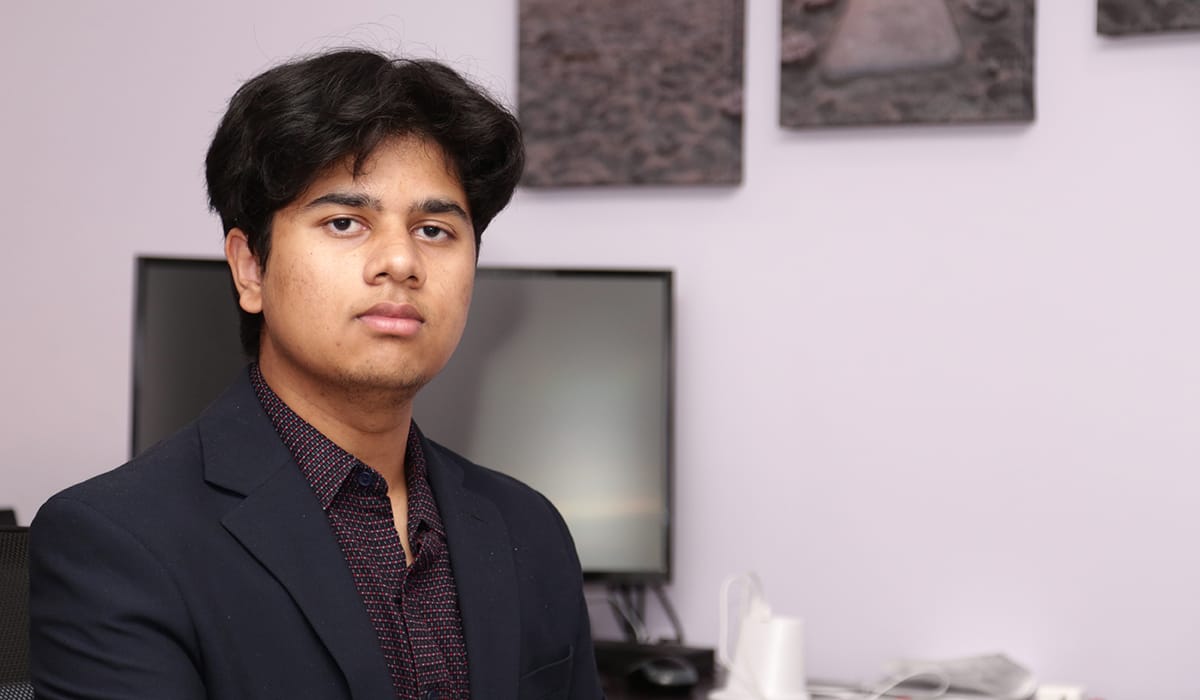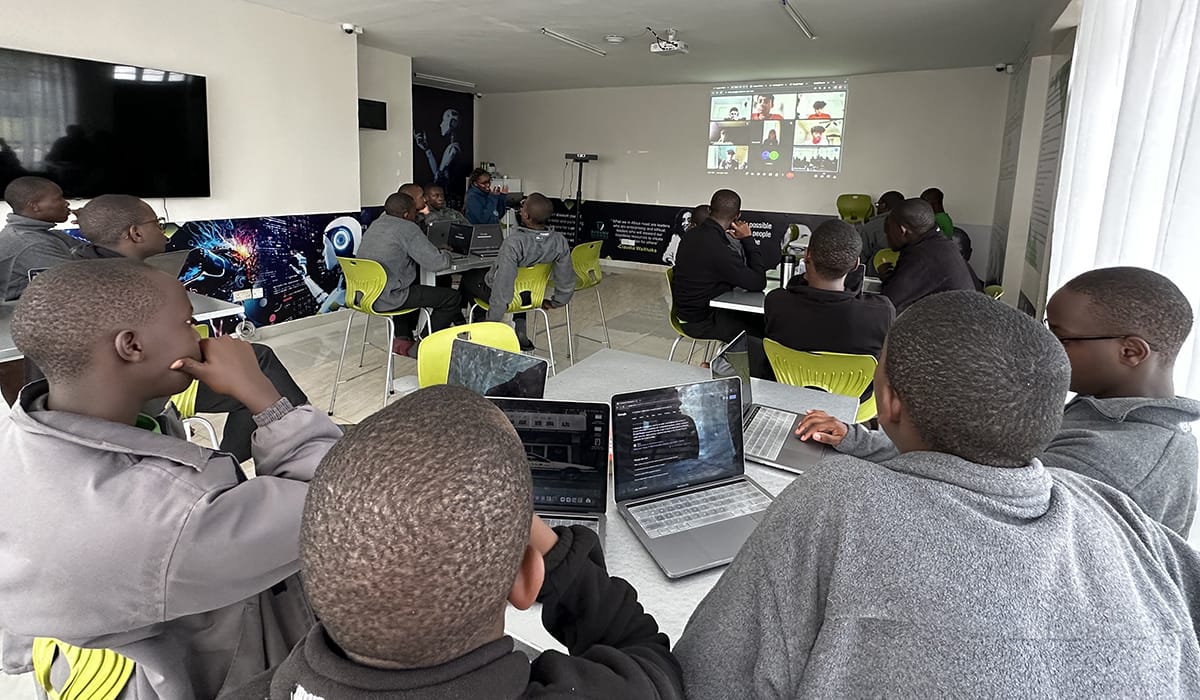High School Student Bridges the Digital Literacy Gap Worldwide

Meet Daily Point of Light Award honoree Maurya Bonu. Read his story, and nominate an outstanding volunteer or family as a Daily Point of Light.
During the COVID-19 pandemic, the now 17-year-old Maurya Bonu struggled with communicating with his grandparents, who weren’t comfortable using technology. This initial struggle quickly turned into an idea to help those who need it learn the digital tools they need to succeed and communicate with others around them. His nonprofit Code2Connect was born, and he’s served as co-founder ever since.
With Code2Connect, Maurya teaches middle school students coding and reaches out to international organizations to partner alongside him and his peers with the mission of providing resources to underserved communities. Bonu has helped teach more than 3000 students, raised thousands towards digital literacy and continues to work with numerous schools in Kenya, Tanzania and Rwanda.
What inspires you to volunteer?
The main reason I started this organization happened during COVID-19 – when I saw that everything was moving online to virtual learning and in remote learning, it was really important to have the right digital tools. During that same time, I was trying to communicate with my grandparents who I couldn’t meet face to face because they’re older. Communicating with them when they didn’t have a bunch of tech experience was difficult like being able to use FaceTime, Skype or things like voice chatting. They weren’t able to use them. And I really just realized the importance of being digitally literate to communicate with others around the world and in your own community.
From there, me and a group of my friends saw that there was a need to ensure that there was equitable access to digital literacy and digital education. We created Code2Connect to do just this. Originally, we were community-based, mostly working for local growth and in local areas. Eventually, we started to get bigger and we started working in other states, and then also internationally.
So, I think just like moving from local to international, we were able to get a lot of students that had different experiences. And I think that’s something that’s really driving me today to continue my work; seeing all these people from different areas of the world being connected by our organization. And also just being able to see how it’s improving their lives and actually creating an impact. I think that’s the reason why I like continuing to do the work that I’m doing right now.
Tell us about your volunteer roles with Code2Connect.
I’m a co-founder of the organization and it was started by me and a group of friends. At first, we worked mostly on making a website and teaching some of the digital courses to ourselves to practice. We were teaching basic things like email usage and some beginner coding lessons like Python and web development. That was nearly four years ago. As we started to grow, we gained partnerships and started working with different organizations. That’s a lot of the work that I do today — making sure that communication and partnerships are strong.
For example, we work with the focused on Kenya. We also work with the Tanzania Development Fund and Grow Ghana. Those are all organizations that are focused on different countries. In my role as director, I’m basically facilitating communication between those different groups. And I’m also just always looking out for new opportunities for us to expand and grow into new areas.Specifically, I work as director of communications for the organization and so my role right now is to lead the communication team. We work on reaching out and securing new partnerships and new opportunities. Another thing that I do right now is trying to expand our financial team.
I also work with our existing team to get funding and donate computers and laptops in addition to other tech to the organizations and chapters that we work with in Rwanda, Ghana and Kenya. So most recently, I was able to get a grant from Google and Microsoft, and that was really integral in being able to provide laptops and computers to those students in other countries.
What’s been the most rewarding part of your work?
I think the most rewarding part of the work is just meeting new people. I’ve met some incredible people working, originally teaching people, just being able to meet students and just being able to learn so much from them. And more recently, I’ve been able to meet people that are as passionate as I am about working in digital literacy and improving education across the world, like leaders for organizations like Grow Ghana and being in communication with them, bouncing ideas off of different people. It’s been really incredible to find a community that is passionate about making change. And I think that’s something that has been really impactful in my journey for the last four years.
What have you learned through your experiences as a volunteer?
I think one of the biggest takeaways I’ve had is that you always have to keep going after opportunities. Whatever you see, you have to take the opposite to heart. There are so many instances where we could have just said, let’s stop here — let’s not expand into a new country and bring opportunities to new people. And every time that came up and there was an opportunity to expand, I think as an organization, we took that opportunity to go into new countries, meet new people and truly collaborate. I think having that drive to push forward is something that I’ve really learned. I’ve really taken away lessons from my experience just in the last four years.

Why is it important for others to get involved with causes they care about?
I think the reason why people should be getting involved and the reason why it’s important is because without taking that leap and becoming involved, you can’t create change. And if you want something to change, the only person that can really start that movement and really make a difference is you. Without taking that first step, others can’t follow you. Because in many cases, the work that you’re doing is something new, something that people haven’t done. When they see you doing the first step, it motivates others to do the same thing. And I think being that person that takes that leap motivates others to do the same thing. And then you’re able to create a movement behind you that achieves the goal that you were hoping to achieve in the first place.
Things are really advantageous for us in the United States because we are able to have 100 opportunities to go after anything. We’re able to make an impact, the work that we do here in the United States is able to have an impact globally due to the reach. I think it’s really important for us as global citizens to understand the impact that we can have and look for opportunities everywhere in everything that you do, even locally. I think for anyone that’s looking to try to get into this line of work and try making an impact on others, I’d say it’s important to start locally. And as you grow as you get, as you realize that your work is really important. You try to find a community that also shares that same belief because without finding that community, it is difficult to do everything yourself. And I’ve been really lucky to have a group of colleagues and friends that have really pushed me to be the best that I can be and push our organization forward. So I think it’s really important to find a community within that goal that you’re trying to achieve.
Tell us about future partnerships, programs or events that you are excited about.
So, we’re really focused right now on our Rwanda chapter, which was started pretty recently. And we’ve been working on organizing on the ground volunteers. Right now, we have over 65 volunteers in Rwanda and we’re looking to increase that chapter because we’ve seen from some of the statistics that we’ve gathered and the information that Rwanda has lower levels of digital literacy, especially regarding the gender divide and women’s education in Rwanda. We’re hoping to address that problem by focusing on women’s schools in the area and really just honing in on that specific problem by increasing the support to our Rwanda chapter.
Another thing that we’re trying to do is work with some of our chapters and some of the organizations to create a virtual hackathon to maybe connect these different organizations that all are really doing impactful work in their own countries and being able to create a community of like a global community or across the continent of Africa. We’d like to work together and develop ideas, plans and also just bounce ideas off of our community. We hope that these independent organizations will be able to collaborate with us in organizing this hackathon and being able to incentivize people across the continent to work together and increase digital literacy across the board.
What do you want people to learn from your story?
I think the one thing that I would hope people learn is that the way you make an impact doesn’t have to be something that’s really profound; it can be something as simple as helping teach your grandparents how to use their computer. It doesn’t have to be some grandiose way to make an impact but can really just start from you and one other person. That’s where the passion for creating change starts with interpersonal connections and finding a personal connection and then taking that and really
expanding it and using it to help others.
Do you want to make a difference in your community like Maurya? Find local volunteer opportunities.
